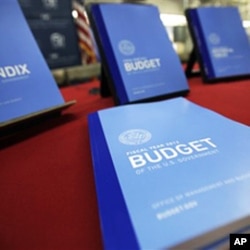As President Obama and the U.S. Congress consider major budget cuts to reduce the deficit, many aid organizations warn there could be severe consequences for the world’s poor.
Jodee Winterhof, vice president of policy and advocacy for CARE, is among those raising concerns about reductions in the International Affairs Budget.
“The International Affairs Budget, in general, is absolutely critical to fighting extreme poverty and hunger and helping at least a billion people around the world who are struggling to survive on less than a dollar a day,” she says.
She calls the proposed budget cuts “unprecedented,” adding that U.S. government spending has a direct effect on improving lives.
“What CARE has seen in these communities around the globe is that there have been advances and progress that we have made in these efforts. And particularly in terms of thinking about how communities and families are more stable because of some of these investments. And I think that is absolutely important,” she says.
To the extreme
“It’s hard to fathom in the United States when we talk about somebody living on less than a dollar a day,” she says, “There will be weeks on end across their year where they can’t find enough food or they can’t find enough nutritious food to sustain and support their families.”
This could result from no fault of their own, such as through droughts or floods destroying crops. Or perhaps their small business fails in hard economic times.
“Right now, we’re on the verge of some price spikes with food around the globe. So, these conversations about cutting programs that really do support and sustain families…is in my opinion a dangerous conversation to be having and really will pose some intense challenges,” says Winterhof.
This week, World Bank President Robert Zoellick warned about 44 million people have become impoverished since June due to higher food prices. He said the cost of food is reaching “dangerous levels” and could contribute to unrest.
Moral leadership
In a statement about the proposed budget cuts, CARE says, “The U.S. government’s commitment to America’s moral leadership, national security and economic future around the globe is at stake.”
Winterhof says, “Really what CARE sees up close and personal is that we have been witness to profound differences that this has made and particularly in the lives of women and…children.”
She says over the past 50 years, U.S. efforts have helped bring a 50 percent reduction in child deaths.” What’s more, she says, improving education has had profound effects on girls.
“For every year that they get beyond 4th grade, it means an increase in their wages that could be 10 to 20 percent,” she says.
Big bang for the buck
It’s estimated U.S. foreign aid is one percent or less of the federal budget. Winterhof says she believes the average American is unaware that the percentage of U.S. foreign aid is so small compared with the overall budget. She says it’s money well spent.
“Groups like CARE actually leverage partnerships from individual donations, from corporate donations and other donations around the country. So, in essence, the money that the federal government puts forward leverages private dollars. And I think that’s also important for the American public to know,” she says.
Generous Americans
Over a year ago, a powerful earthquake struck Haiti, killing hundreds of thousands of people.
“Millions of people in the United States gave money to that disaster. So, there is willingness across this country to participate and to support people around the globe,” she says, “The American people are actually engaged on these issues.”
In its statement, CARE says it recognizes that Congress must “take a hard look at the most effective and efficient ways to leverage our foreign aid dollars.” But it also calls on members of the House of Representatives “to reject these harmful and drastic cuts that jeopardize both our country’s global leadership as well as millions of the world’s most vulnerable people.”




